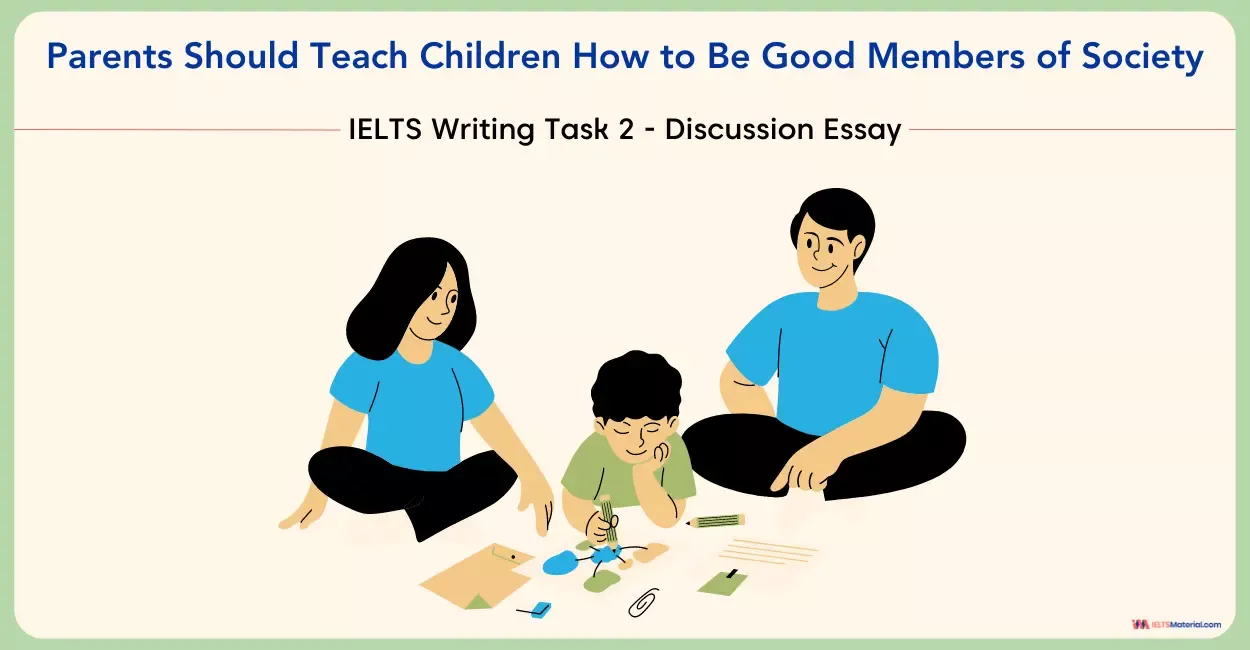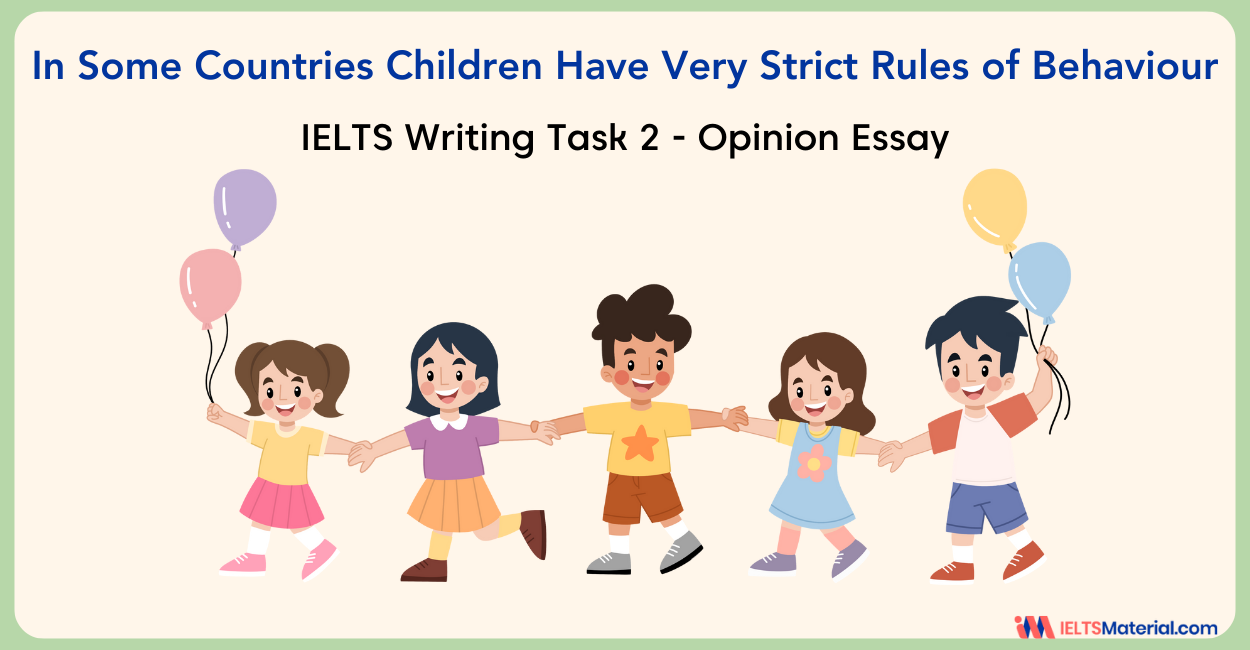IELTS Writing Task 2: In Some Countries Children Have Very Strict Rules of Behaviour
Table of Contents
Limited-Time Offer : Access a FREE 10-Day IELTS Study Plan!
The IELTS Writing module’s Essay Writing section poses a difficulty for numerous IELTS candidates. Hence, it is essential to improve your essay writing abilities before undertaking the IELTS.
The IELTS Writing Task 2 is a crucial part of both the General Training and Academic versions of the IELTS exam. It assesses your ability to write a well-structured and cohesive essay in response to a given topic.
In this task, you will be presented with an Opinion Essay essay prompt, with a statement or topic and asked to state your opinion on it. You must then provide supporting arguments to back up your position.
To effectively prepare for the IELTS Writing Task 2, it is highly recommended to practice with a variety of sample essays. IELTSMaterial.com offers a comprehensive collection of IELTS writing task 2 practice tests, that can help you hone your essay writing skills and achieve a high score in the exam.
Question
Give reasons for your answer and include any relevant examples from your own knowledge or experience.
Structure Breakdown
Essay
Introduction
Body paragraph 1
Body paragraph 2
Conclusion
|
Band 7 Sample Answer
Introduction:
The formative years of childhood are universally acknowledged as a critical stage in a child’s life. People have a range of opinions on whether children should be closely watched and follow strict rules. Some prefer independence, while others stress the need for control. In this essay, I will opine that guiding children is important for their development and future success.
Body Paragraph 1:
The main reason to support strict control over children is their difficulty in knowing right from wrong. Families have a crucial role in shaping a child’s behavior, and parents need to be watchful in understanding and guiding their children’s actions. Caring for and nurturing children’s growth promotes good behavior, preparing them to make meaningful contributions to society. Therefore, families have a crucial role in raising up a generation with strong values.
Body Paragraph 2:
Another compelling reason to impose strict rules on children is their role as the pioneers of the future. Children should be imparted with a model of behavior that resonates positively with those around them, and the family serves as the primary institution for instilling such values. By providing children with a disciplined upbringing, families contribute to the creation of future leaders who are equipped to navigate life successfully. Consequently, it is the responsibility of families to mold children into individuals who excel in their personal and societal roles.
Conclusion:
In conclusion, controlling children’s behavior is crucial. Guiding them in their early years helps set them on a positive path, contributing to the creation of a promising and virtuous future. Families, being the main influencers, must realize the importance of instilling values that will benefit society by nurturing responsible and capable individuals.
Band 7 Vocabulary
- Formative:
Meaning: Critical in the development or formation of something.
Example: The formative years significantly impact a person’s character.
Acknowledged:
Meaning: Recognized or accepted as true or valid.
Example: It is universally acknowledged that education is crucial for personal development.
- Range:
Meaning: A variety or extent of something.
Example: People have a range of opinions on parenting styles.
- Opine:
Meaning: To express an opinion.
Example: In this essay, I will opine that guiding children is essential for their development.
- Crucial:
Meaning: Extremely important or necessary.
Example: The formative years are crucial for building a strong foundation.
- Watchful:
Meaning: Being attentive and observant.
Example: Parents need to be watchful in guiding their children’s actions.
- Oversight:
Meaning: Supervision or management.
Example: Proper oversight ensures positive behavior in children.
- Exemplary:
Meaning: Serving as a desirable model; outstanding.
Example: Families have a responsibility to foster a generation with exemplary principles.
- Impart:
Meaning: To convey information or knowledge.
Example: Children should be imparted with values that resonate positively.
- Navigate:
Meaning: To find one’s way or manage successfully.
Example: A disciplined upbringing helps children navigate life more effectively.
Band 8 Sample Answer
Introduction:
The approach to parenting varies globally, with some countries emphasizing strict rules for children, while others prioritize granting them considerable freedom. I believe that striking a balance between these two approaches is crucial. Children should adhere to certain behavioral guidelines while also enjoying sufficient liberty.
Body Paragraph 1:
Countries that provide excessive freedom to children often witness negative consequences, as the young ones may lack the maturity to distinguish between right and wrong. Excessive freedom without proper guidance can lead to reckless behavior, including underage driving and even more serious offenses such as bringing weapons to school. The lack of boundaries and consequences can have detrimental effects on public safety and moral growth.
Body Paragraph 2:
Conversely, an excess of rules can hinder children’s growth, stifling their ability to think independently and make choices. Research indicates that children raised with proper care and fewer restrictions are more likely to thrive in life. Imposing too many rules may lead to depression and hinder normal development, emphasizing the need for a balanced approach that respects a child’s personal space. In my opinion, a middle ground should be sought, where certain rules guide children’s behavior without suffocating their individuality. Rules should focus on preventing actions that could harm themselves or others, teaching them respect for authority. Simultaneously, children should enjoy a degree of freedom in making choices regarding their diet, activities, and free time, provided these choices align with responsible behavior.
Conclusion:
In summary, rules play a crucial role in shaping responsible adults, but it’s vital to find a balance between rules and freedom when raising children. Rules should guide rather than restrict, giving children the space they need for healthy growth. By achieving this balance, societies can ensure that children become responsible individuals without compromising their essential freedom during their formative years.
Band 8 Vocabulary
- Approach:
Meaning: A way of dealing with a situation or problem.
Sentence: Different cultures have their unique approach to education.
- Crucial:
Meaning: Extremely important or necessary.
Sentence: Good communication is crucial in building strong relationships.
- Reckless:
Meaning: Acting without thinking about the consequences.
Sentence: His reckless driving led to a serious accident.
- Detrimental:
Meaning: Causing harm or damage.
Sentence: Lack of exercise can have a detrimental effect on one’s health.
- Stifle:
Meaning: To prevent or hinder the development of something.
Sentence: Too many rules can stifle creativity in children.
- Thrive:
Meaning: To grow or develop well.
Sentence: Some plants thrive in direct sunlight.
- Imposing:
Meaning: Forcing others to accept one’s will.
Sentence: The teacher was criticized for imposing strict rules without considering the students’ opinions.
- Suffocate:
Meaning: To feel confined or restricted.
Sentence: It’s important to give employees some autonomy, or they may feel suffocated in their work.
- Align:
Meaning: To bring into proper coordination or agreement.
Sentence: Her values align with the company’s mission.
- Simultaneously:
Meaning: Happening at the same time.
Sentence: The two events occurred simultaneously, creating chaos in the city.
Practice & Prepare with IELTS Writing Task 2 Sample Questions and Answers
Band 9 Sample Answer
Unlock Explanations
If you want to have a look at the band 9 sample answer, sign up!
Introduction
Parenting styles differ worldwide, ranging from strict rules in some countries to a more flexible approach in others. Finding a balance between necessary rules and allowing children some independence is a complex issue that needs thoughtful consideration. In this essay, I will explore how much children should follow rules, emphasizing the importance of a balanced approach that encourages both discipline and independence.
Body Paragraph 1
In societies where strict rules govern children’s behavior, a structured environment is provided, contributing to the development of discipline, responsibility, and respect for authority. Such rules lay a foundation for character development, shaping individuals capable of navigating adulthood with accountability. For instance, countries with rigid rule systems often witness children internalizing values that foster social cohesion and order.
Body Paragraph 2
On the flip side, too many strict rules can limit creativity and impede critical thinking development. Allowing kids the freedom to explore interests and make choices encourages independent thought and self-confidence. In countries with a more flexible approach, autonomy helps nurture a generation adaptable to a changing world. Children in such environments learn decision-making, understand consequences, and develop responsibility through hands-on experiences.
Conclusion
In conclusion, finding the right balance for children in following rules requires a thoughtful and well-rounded viewpoint. While rules contribute to character development, excessive focus on them can hinder creativity and critical thinking. Striking a balance between discipline and freedom is essential, recognizing the importance of individual differences. Taking a thoughtful approach to setting rules ensures the overall development of children, preparing them for future challenges.
Band 9 Vocabulary
- Discipline:
Meaning: The practice of training people to obey rules or a code of behavior.
Example: Strict parenting styles often emphasize discipline to instill a sense of order and responsibility in children.
- Responsibility:
Meaning: The state or fact of having a duty to deal with something or someone.
Example: Parenting involves teaching children a sense of responsibility for their actions and decisions.
- Cohesion:
Meaning: The action or fact of forming a united whole.
Example: Strict rule systems in some societies contribute to social cohesion by establishing shared values and norms.
- Autonomy:
Meaning: The ability to make one’s own decisions and act independently.
Example: A more flexible parenting approach promotes autonomy, allowing children to develop decision-making skills.
- Adaptable:
Meaning: Able to adjust to new conditions or changes.
Example: Children raised in environments with a flexible approach tend to be more adaptable to different situations.
- Internalize:
Meaning: To make a belief or attitude a part of one’s own character by learning or unconscious assimilation.
Example: Children in societies with strict rules often internalize societal values from a young age.
- Impede:
Meaning: To delay or obstruct the progress of something.
Example: Excessive rules can impede a child’s natural creativity and curiosity.
- Hands-on:
Meaning: Involving or offering active participation rather than theory or abstract thinking.
Example: Children benefit from hands-on experiences that allow them to learn through direct involvement and exploration.
- Well-rounded:
Meaning: Having a personality and skills that are fully developed in all aspects.
Example: A well-rounded education includes a balance of academic learning, social skills, and personal development.
- Accountability:
Meaning: The fact or condition of being accountable, responsible, or answerable.
Example: Rules in parenting contribute to the accountability of children for their actions, fostering a sense of accountability in them.
Connectors Used in the Above Sample Answers
Connectors, also known as connectives or transition words, are words or phrases that link ideas or parts of a sentence or paragraph together. Here are some of the connectors used in the above sample answers:
- For instance
- On the flip side
- Furthermore…
- On the other hand
- Conversely
- In my opinion
- Simultaneously
- However
- In summary
- In conclusion
- To sum up
Book a session with an IELTS Expert Session today & Get Secret Insights to Writing a High-scoring IELTS Writing Task 2 Essay, Limited Seats Available!
More Writing Task 2 Topics:
Practice IELTS Writing Task 2 based on Essay types
Start Preparing for IELTS: Get Your 10-Day Study Plan Today!
Recent Articles


Raajdeep Saha
Kasturika Samanta

Akanksha Tripathi



Post your Comments